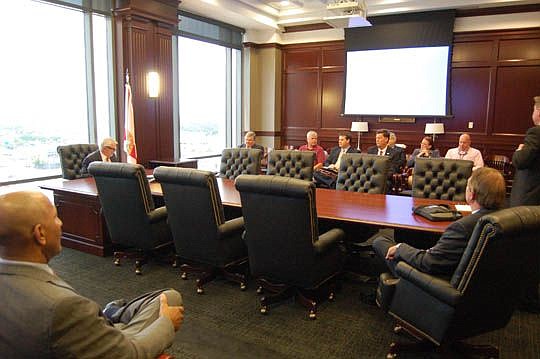
Judges operate with a stricter set of standards.
That’s true every day, but it’s particularly true when a judge or a candidate seeking judicial office is running a political campaign.
The State Courts Administrator organized a series of forums last week to ensure judges and candidates understand the provisions of Canon 7, part of Florida’s Code of Judicial Conduct.
Fourth Circuit Chief Judge Mark Mahon hosted the forum Thursday in Jacksonville.
A former state representative, Mahon described the period leading up to an election as “one of the most tumultuous and confrontational times.”
He also let the judges and candidates know “the (Florida) Supreme Court wants to make sure everyone conducts themselves professionally.”
In the 4th Circuit, seven judges will be on the Aug. 30 ballot without opposition: Mahon, Marianne Aho, Russell Healey, Angela Cox, Steven Fahlgren, Jack Schemer and Linda McCallum.
Circuit Judge Bruce Anderson is being challenged by David Trotti and Circuit Judge Mark Hulsey will face Gerald Wilkerson.
County Judge Roberto Arias, a member of The Florida Bar’s Judicial Ethics Committee, said candidates for judge must avoid behavior often exhibited by people running for other offices.
“Presidential candidates can insult each other like school children. We can’t do that,” Arias said.
He said the rules under Canon 7 go into effect even before a judge or a challenger files to run in an election.
“You’re a candidate as soon as you declare your intention to run for office,” said Arias.
Among other restrictions, candidates may not hold office or act as a leader in a political organization; they may not publicly endorse or oppose another candidate for public office; they may not attend political party functions; and they may not solicit funds.
“You cannot ask for any money at any time. Period,” Arias said.
Canon 7 also applies to campaign consultants, workers, family member and friends.
“Maintain the dignity appropriate to judicial office and encourage your family and friends to do likewise,” said Arias. “If you have any doubt if it’s the right thing to do, the default position should be don’t do it.”
Rogers Towers managing partner Fred Franklin, a member of The Florida Bar Board of Governors, said seeking election to the bench is a “trying and arduous process,” but “there is no higher calling than to serve in the judiciary.”
He reinforced what Arias said about candidates being responsible for the conduct of other people.
“All those working for a judge’s campaign are under the same rules,” Franklin said “Those people are an extension of you.”
Arias cautioned the judges and candidates to be vigilant. The Supreme Court is closely monitoring judicial campaigns and deviation from Canon 7 won’t be tolerated.
“The Supreme Court is getting tough on lawyers — and really tough on judges,” he said.
Mahon made sure everyone who attended the forum signed the registration sheet, which will be provided to the Supreme Court for verification of attendance.
He described signing in as a “warning component.”
“They will know you went to the forum,” Mahon said.
The complete text of Canon 7 is available at floridasupremecourt.org, click on Opinions, Rules and Other Court Documents.
@DRMaxDowntown
(904) 356-2466